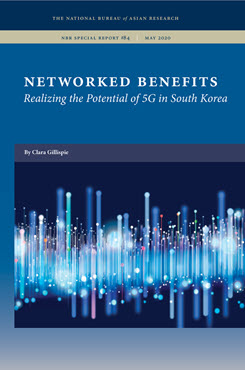NBR Special Report no. 84
Networked Benefits: Realizing the Potential of 5G in South Korea
This report explores how South Korea seeks to navigate the 5G era, with a focus on the role of policy in shaping or restricting how emerging technologies can be deployed.
EXECUTIVE SUMMARY
MAIN ARGUMENT
South Korea has earned a well-deserved reputation as one of the world’s most innovative economies, and its substantial investments in 5G could position it to realize significant returns. Yet Seoul is currently grappling with what role the government should play in guiding how data can be aggregated, used, and shared, which in turn will affect what kinds of products are developed. Several domestic policy debates focus on whether the country’s established protections are too restrictive and limit its competitiveness. How Seoul navigates these issues has implications for not only South Korea but also other countries looking to strengthen their own governance practices.
POLICY IMPLICATIONS
- The Personal Information Protection Act, the Act on the Protection, Use, Etc. of Location Information, and the Korean Land Survey Act shape how data can be collected within South Korea. Any revisions should aim to address domestic concerns while also meeting or exceeding international benchmarks for privacy and data protection, such as those set by the Asia-Pacific Economic Cooperation (APEC).
- South Korea’s challenges are not exclusively regulatory in origin. A legacy of top-down approaches and a relatively homogenous field of domestic specialists are also undermining efforts to convert available information into useful information. Addressing this problem requires bringing more people to the table and ensuring greater diversity among those represented.
- South Korea cannot afford to act alone. Instead, it should consider expanding researcher exchanges, information sharing, and joint initiatives with other countries to support regional interoperability in both product development and the coordination of governance standards. As part of these efforts, strengthening coordination with the U.S. could also play a meaningful role in advancing both countries’ interests.
Clara Gillispie is a Senior Advisor at the National Bureau of Asian Research and a 2019–2020 CFR International Affairs Fellow at Carnegie India.
NOTE: The author thanks the Korea Foundation, whose generous grant support provided invaluable resources that enabled field interviews and other research, as well as June Park and Ashley Dutta, who reviewed earlier drafts. Additionally, this report partly draws on research the author conducted for the paper “South Korea’s 5G Ambitions,” Korea Economic Institute of America, March 23, 2020, http://www.keia.org/sites/default/files/publications/kei_aps_gillispie_200316.pdf.


